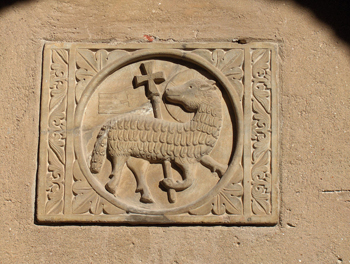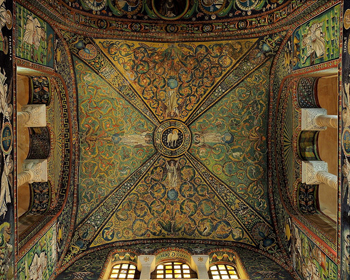For Sunday January 15, 2017
Lectionary Readings (Revised Common Lectionary, Year A)
Isaiah 49:1–7
Psalm 40:1–11
1 Corinthians 1:1–9
John 1:29–42
The gospel of John for this week begins with that mysterious Prologue about Jesus — the eternal Word of God, the light and life of the world. Not that any of this was obvious back then, or made sense to anybody. Our dark world did not "understand" the light, says John, it didn't "recognize" or "receive" him. Contemporary skepticism should not be so smug.
After this Prologue about Jesus, the gospel continues with a Preamble about John. As they often do, the religious authorities, who viewed themselves as the gatekeepers to God, were very unhappy about the reports that they had heard about some religious zealot who was baptizing throngs of people in the Jordan River. And without their knowledge or permission! So, they sent a delegation "to ask him who he was."
John the Baptizer issued an emphatic triple Disclaimer. "He confessed, and did not deny, and he confessed: 'No, I am not the Christ. I'm not Elijah, nor the Prophet.'"
The inquisitors were flummoxed. They needed a better answer to take back to Jerusalem. "Well, if that's the case, why are you baptizing people, performing an official rite when you have no official sanction? Who do you think you are? What do you say about yourself?"
 |
|
Medieval lamb of God with halo and cross, Croatia.
|
"You're asking the wrong question," John replied. "The real question isn't about me but about Him."
"I'm just a lonely voice in the wilderness pointing everyone to this Man, so that all people might believe. I'm not worthy to lick his boots. And to be honest, just like you and all the world, I myself did not know him. And I would not have known him were it not for the descent of God's Spirit like a dove onto this Man. But that's what happened, that's what I saw and heard, and so now I testify that this man is God's Son."
John then pivots to what I call "three days with Jesus." I say this because in the next two pages of his gospel there are several obvious time stamps.
After this clash with the institutional authorities from Jerusalem, John says that "the next day" (1:29) he saw Jesus, the One he had just been talking about. The One he hadn't known or really understood. The One he had baptized in the Jordan and on whom he saw the Spirit of God descend. The One about whom he now testified.
After this, "the next day" (1:35) he again encountered Jesus, this time with the brothers Andrew and Simon Peter. John writes that "they saw where he was staying; and they stayed with him that day, for it was about the tenth hour" (4:00 PM). And what a day. Andrew and Peter "followed Jesus." Jesus re-named Peter "the rock" — the man who would deny even knowing him.
And then a third time, "the next day" (1:43) another set of brothers, Philip and Nathaniel, encountered Jesus, who issued them an invitation: "Follow me." It was on this "third day" (2:1) that Jesus performed his first public miracle at a wedding in Cana of Galilee: "He thus revealed his glory, and his disciples put their faith in him."
Exactly who is this One they put their faith in and followed? In the first two pages of John, Jesus was already many things.
Word of God. The unique or only begotten son of his father. Light and life in a world of darkness and death.
Jesus is the sacrificial Lamb of God who takes away the sin of the world. He's the man endowed with God's Spirit, and the Son of God.
 |
|
Lamb of God mosaic in presbytery of Basilica San Vitale, A.D. 547, Ravenna, Italy.
|
Both friends and enemies called him a Rabbi-Teacher. Most people remembered him as the son of Joseph from Nazareth.
He's the long awaited Jewish Christ, Messiah, or Anointed One, the One written about long ago by Moses and the prophets. He's the King of Israel, a light to the Gentiles, and the Son of all Humanity.
Paul calls him "Lord" five times in the first nine verses of his letter to the Corinthians.
In these three days, Jesus speaks for the first time in John's gospel. When Andrew and his friend asked him where he was staying, Jesus said, "Come and see." And so they did, spending the day and perhaps that night with Jesus.
They were so taken by that day with Jesus that "the first thing Andrew did," writes John, was to find his brother Peter and say, "Come and see."
The next day, Philip found his brother Nathaniel and said the same thing: "Come and see."
John is unapologetic; he writes for a reason. He wants to convert us — "that you may believe that Jesus is the Christ, the Son of God, and that by believing you may have life in his name" (20:31). He is, in the end, what Mary Gordon calls in her book Reading Jesus the "irresistible incomprehensible." And so, she observes, "the radical challenge of Jesus: perhaps everything we think in order to know ourselves as comfortable citizens of a predictable world is wrong."
Image credits: (1) Wikipedia.org; and (2) Wikipedia.org.





